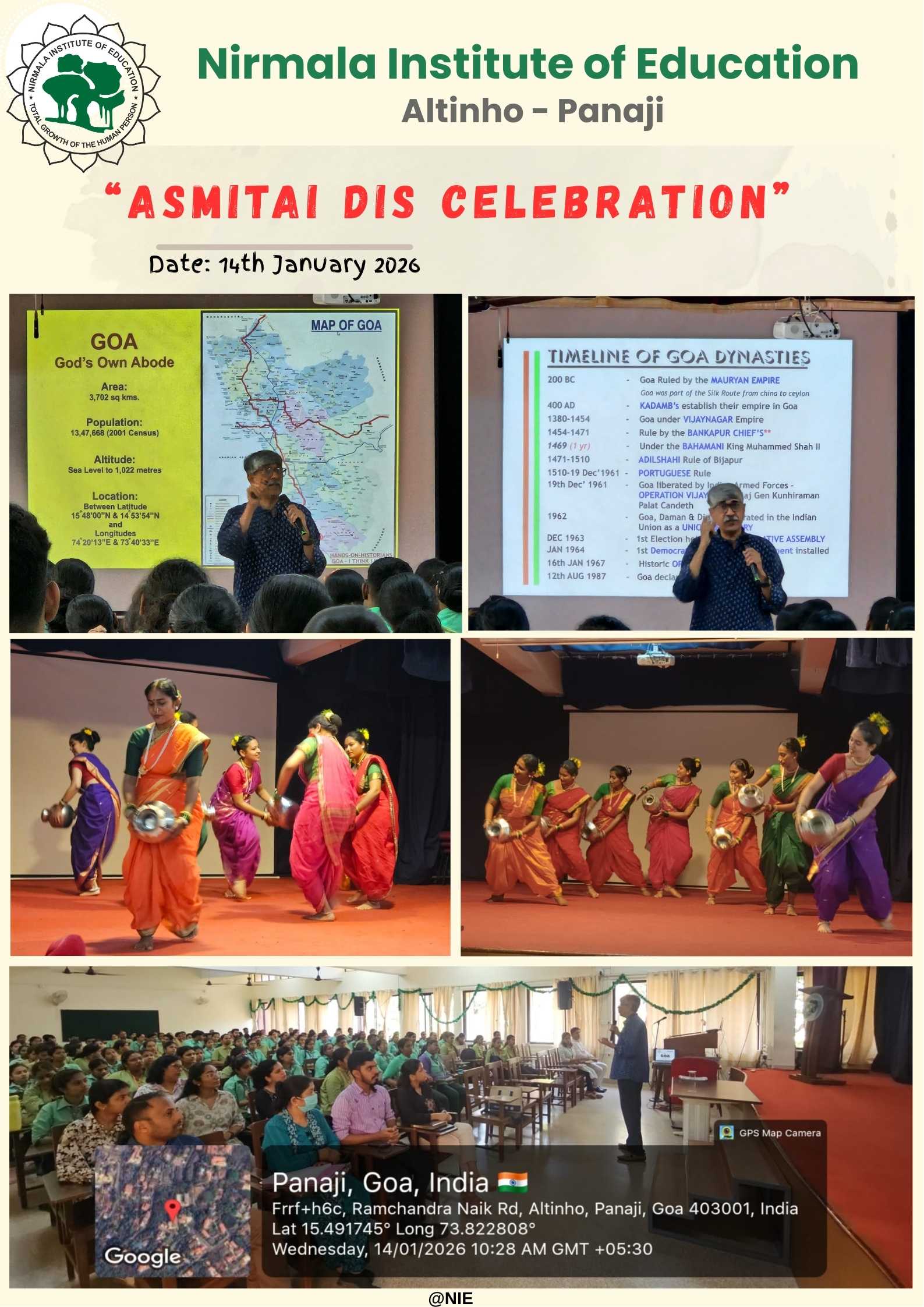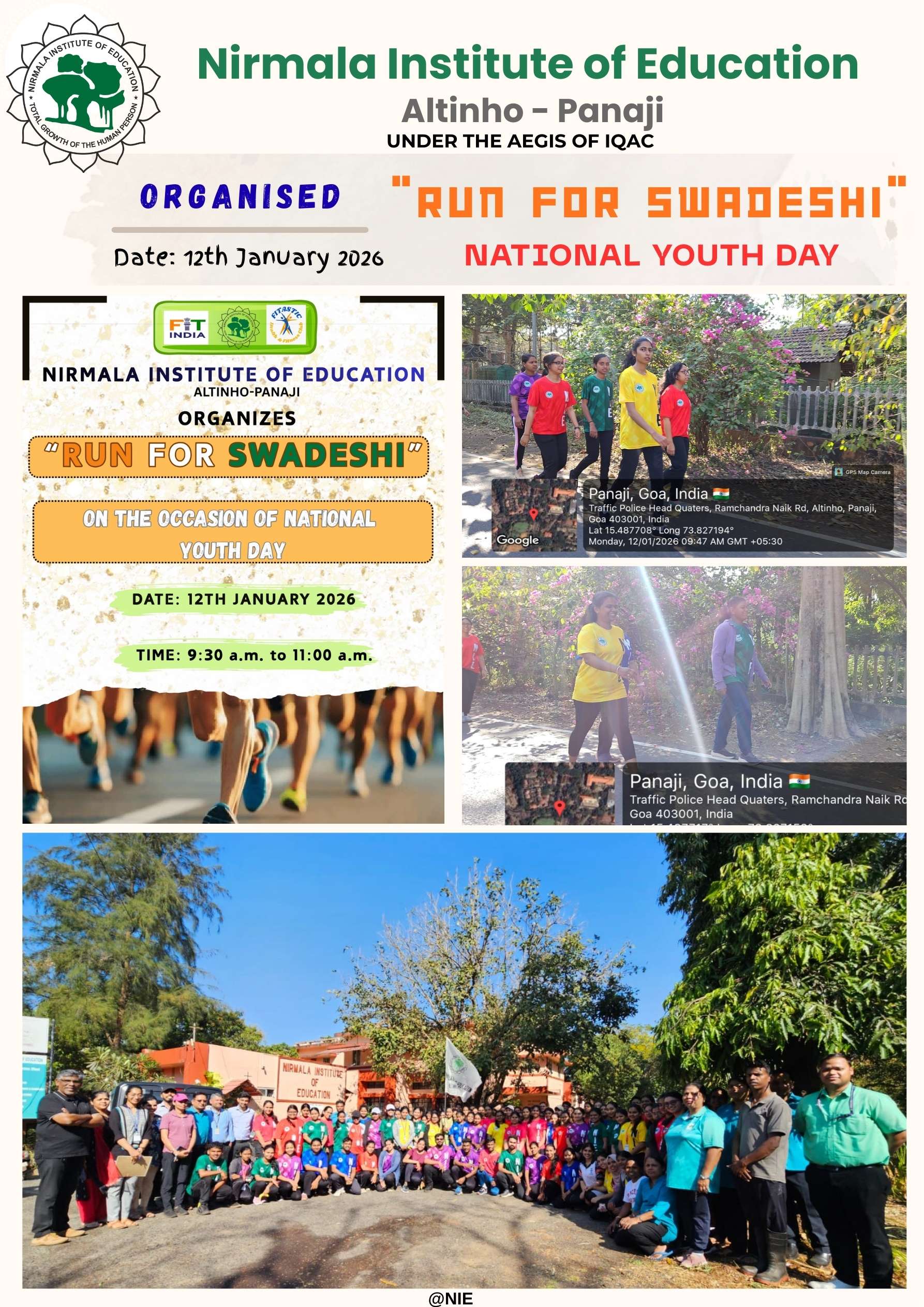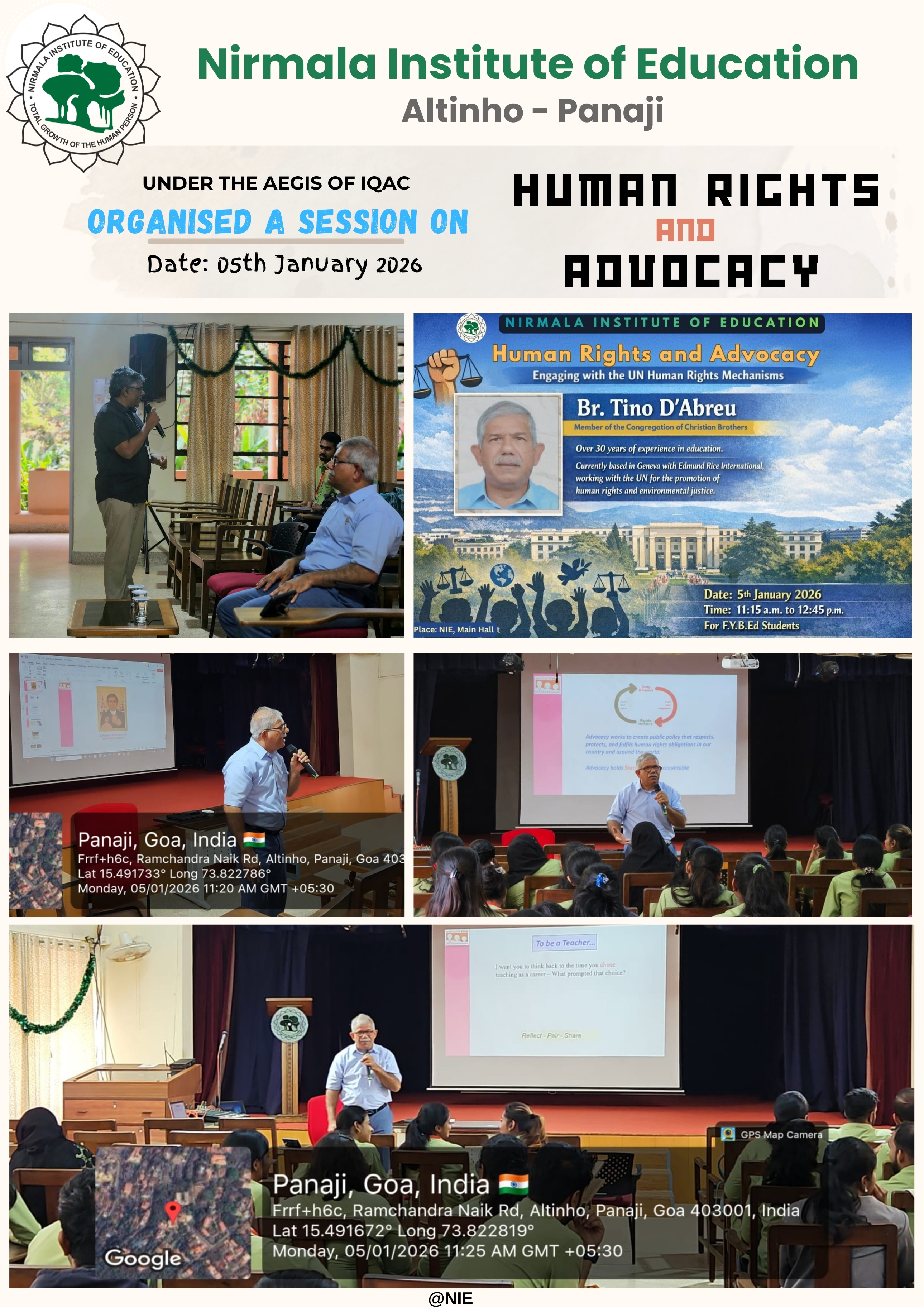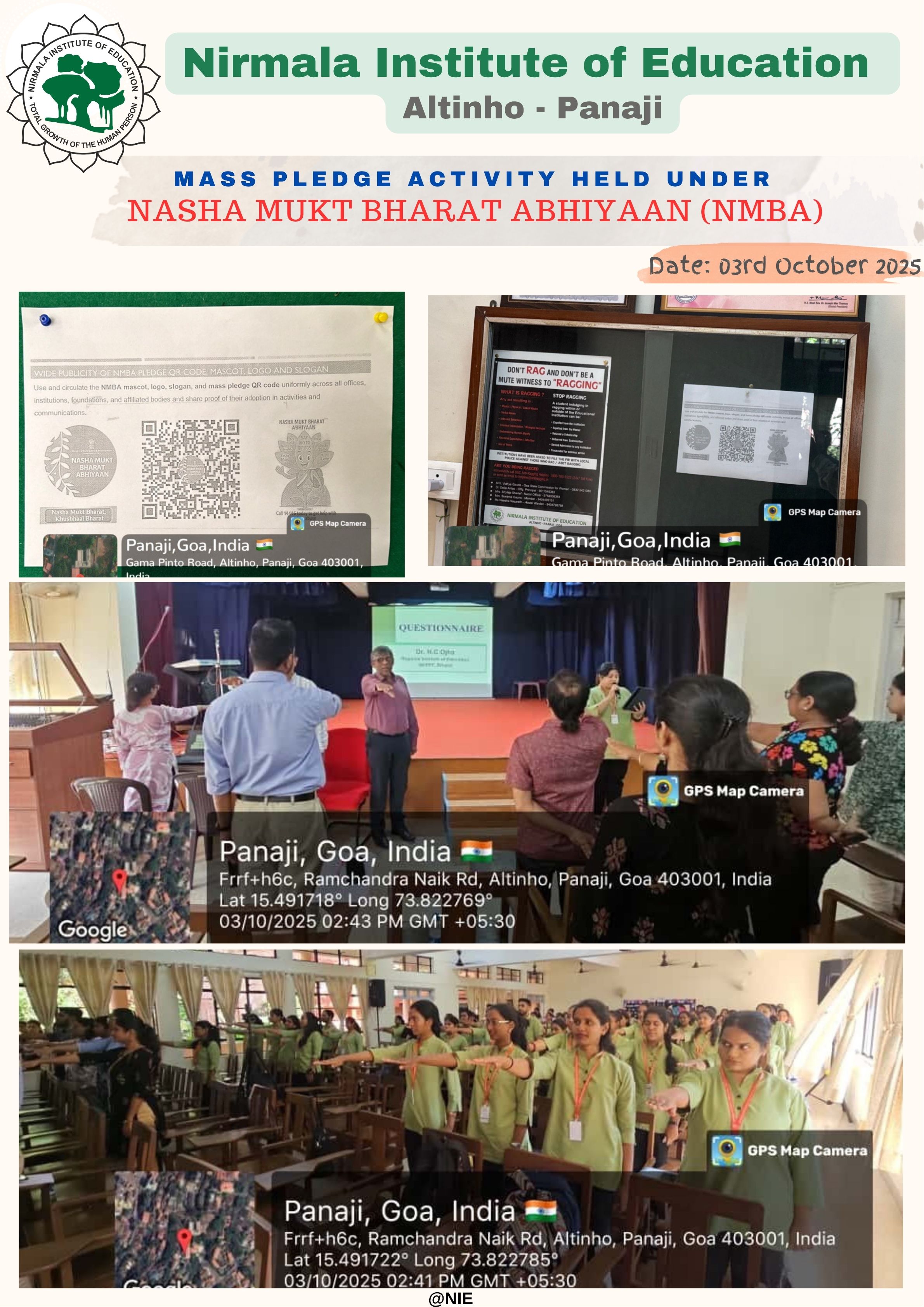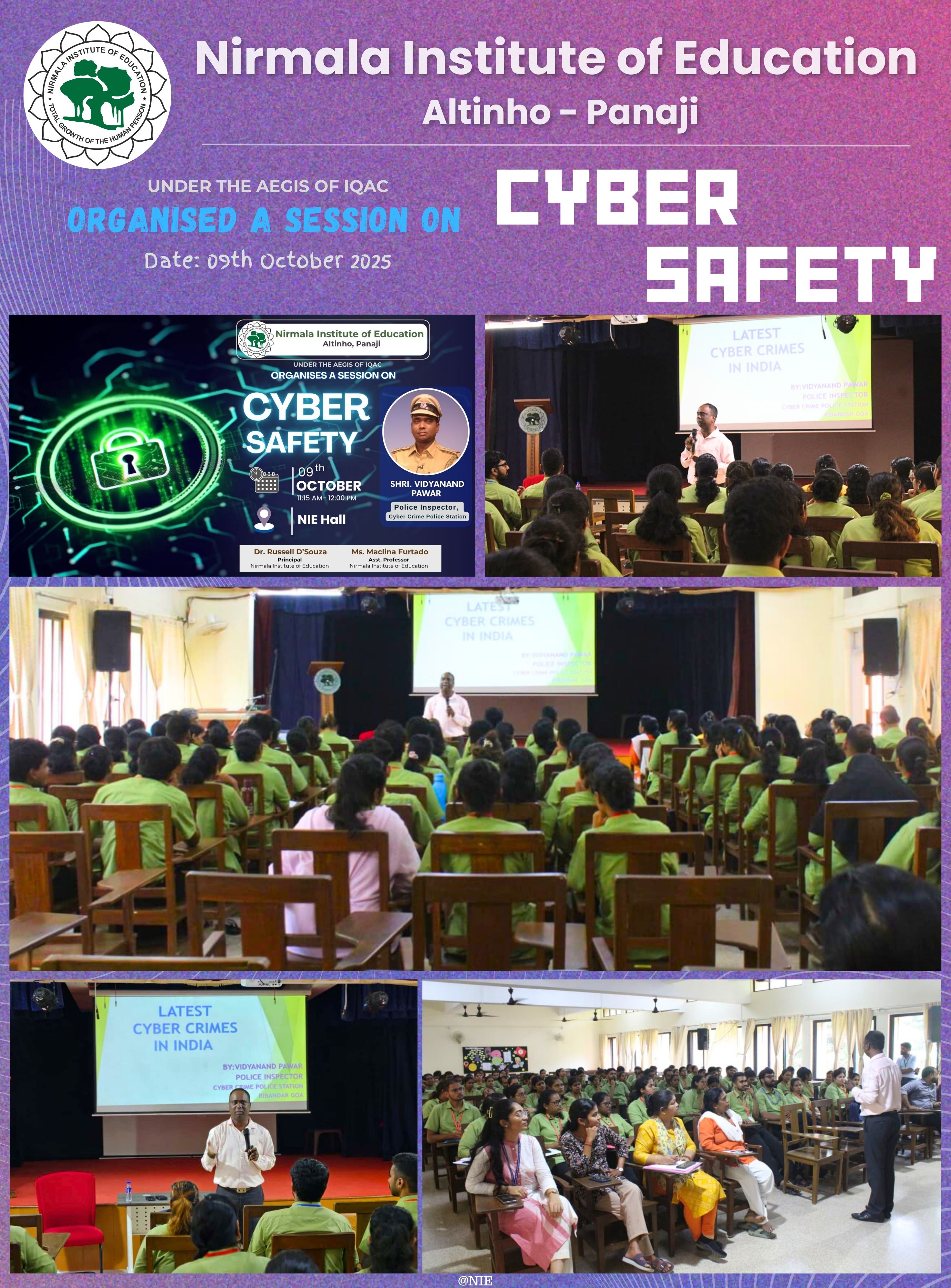Date
Programme Outcomes (B.Ed.)
Programme Outcomes (B.Ed.)
-
To help students discover and appreciate their unique vocation in society.
-
To create a learning environment which integrates theory and practice
-
To nurture, in particular, the values of peace, justice, equality and fraternity.
-
To enable students to understand and cater to the needs of a diverse student population.
-
To encourage students to become catalysts of social transformation
-
To revitalise education through collaboration with different organisations and universities
-
To provide prospective teachers with a stimulating and catalytic environment that is both futuristic in outlook and holistic in perspective for the achievement of excellence.
-
To provide theoretical knowledge interwoven with a repertoire of pedagogical practices, hands-on teaching experience and the inclusion of technology as a teaching and learning tool.
-
To draw out latent talents and creativity through varied co-curricular programmes.
Programme Specific Outcomes (B.Ed.):
Outcome 1 Curriculum and Planning:
Students will apply their knowledge of core content and pedagogy to set goals and objectives for learning based on state and national standards and local curriculum, and design instruction that engages students in meaningful learning.
Outcome 2 The Learner and the Learning Environment:
Students will demonstrate their understanding of cognitive, affective, and psychomotor domains, and other characteristics of their diverse learners, and create an environment of respect, rapport, collaboration and a culture for learning.
Outcome 3 Teaching:
Students will design and deliver meaningful learning experiences for all students by integrating their knowledge of content, pedagogy, the learner and the learning environment by engaging in the reflective instructional cycle of planning, instruction, feedback and assessment.
Outcome 4 Professional Responsibilities for Self-Renewal:
Students will demonstrate their commitment to continuous self-improvement by engaging in collaboration, reflective practice, and research to enhance their teaching skills.
Outcome 5 Professional Responsibilities for School and Community:
Students will demonstrate leadership by participating in the implementation of the vision and mission of the institute, strategic planning/continuous improvement, curriculum initiatives, student support and management systems; and demonstrate a commitment to ethical and equitable behaviour.
Outcome 6 Professional Responsibilities for Technology in Education:
Students will model and apply the National Educational Technology Standards for Teachers (NETS-T) as they design, implement, and assess learning experiences by engaging students through creative and innovative endeavours.
Outcome 7 Culturally Responsive Teaching Practice:
Students will engage in culturally responsive and inclusive teaching practice to help all students regardless of their language, culture, race, geographic location, special needs, or poverty and facilitate learning through collaboration among teachers and students, developing students' competence and potential.
Outcome 8 Effective Communication:
Students use effective and appropriate verbal, nonverbal, written, and media communication techniques in their teaching, professional collaboration, and interactions with students, colleagues, parents, and the community.
Outcome 9 Professional Dispositions:
Students will demonstrate a disposition of professionalism, efficiency, and integrity in their teaching and interactions with students, colleagues, parents, and the community.
Course Outcomes (B.Ed.)
-
Use enriching content and pedagogical knowledge to inform their teaching
-
Develop relevant, rigorous, and developmentally appropriate curricula based on emerging trends and research.
-
Modify curriculum and instruction based on the individual needs of their diverse learner population.
-
Use appropriate assessment tools and techniques to assess their students’ learning and their own teaching to inform future planning and teaching.
-
Attend to the social, psychological, and civic development of their students.
-
Work respectfully and collaboratively with colleagues and community to ensure quality education for all.
Programme Outcomes (M.A. Wellness Counselling)
-
Wellness Counselling Programme is designed to help students acquire Knowledge, skills and attitudes for maximising their potential for academic progress, career development, and personal and social growth.
-
To help students to be aware of their strengths and abilities and to build on them
-
To equip and train students to become counsellors.
Programme Specific Outcomes (M.A. Wellness Counselling):
-
The optimal development and functioning of individuals, groups, and organisations;
-
Appreciation of the strengths and uniqueness of individuals;
-
Respect for the integrity of all people.
Course Outcomes (M.A. Wellness Counselling):
-
Adopt approaches to client interaction that take into account the various contexts in which clients live and function.
-
To endeavour to acquire what Peter Drucker has called the essential qualities of successful leaders-integrity, humility, and generosity.
-
Practice critical roles of self-exploration and personal reflection as components of professional development
Programme Outcomes Post Graduate Diploma Guidance Counselling
-
To enable the participants to arrive at a deeper self-understanding and personal insights
-
To provide the participants with an in-depth understanding of the counselling process
-
To provide a comprehensive, theoretical foundation in guidance and counselling
Programme Specific Outcomes (PGDGC)
-
To equip students with the skills / competencies to function effectively as counsellors
-
To develop in the students’ positive attitude towards counselling
-
To create a pool of professionally trained counsellors to offer guidance and counselling services, specially to the youth



